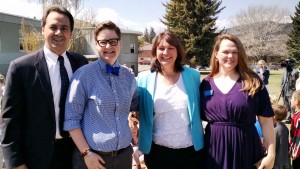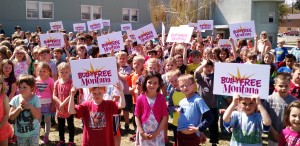Just a few weeks ago, Governor Steve Bullock signed a historic bill into law that marked an important and long overdue victory for our community.
Before the recent passage of the Bully Free Montana Act (HB284), Montana was the only state in the country that did not have an anti-bullying policy on the books. After over a decade of hard work and advocacy efforts, the Montana legislature finally passed the bill this session—providing important resources and support to school districts, while creating safer learning environments for all students.
Even though the Bully Free Montana Act does not have enumerated protections for youth who identify as lesbian, gay, bisexual, transgender, or queer, it is an important first step. The policy empowers each individual school district to enumerate protections and set forth the proper guidelines to ensure all student safety.
School should be a welcoming place where all young people are able to learn and flourish. Unfortunately, far too many LGBTQ youth face a different reality—including fear, intimidation, and violence—making school an unsafe and unaccepting environment.
Seamus Branch, a graduate of Bozeman High School (BHS), faced harassment in school because of his sexual orientation.
“I have amazing friends and parents that were very supportive. That being said, there weren’t many resources for gay and lesbian students, and I’d imagine that was even more true for transgender students.” Seamus recalled. “Plenty of people said things under their breath of course; and two incidents stick out to me. One time I was walking by some students. When I said excuse me to a group of boys, they proceeded to mock me and harass me because of my voice. Another time I was called a faggot in front of a teacher, and they didn’t do anything to interrupt the behavior or address it. They simply did nothing, allowing it to happen.”
According to a recent study, nearly 86.2% of LGBTQ youth report being harassed because of their sexual orientation or gender identity/expression, 44.1% report being physically harassed, and over 22.1% report being physically assaulted.
These experiences can often have lasting impacts on students’ lives; as Seamus explained, “To this day I get very uncomfortable when I hear people with good intentions say gay or faggot. I know that they aren’t trying to be degrading, but it brings back memories of people who used those words to attack me.”
The study also noted that K-12 students who are LGBTQ or thought to be LGBTQ are bullied more than twice as much as any other identifiable group. Given that such circumstances are often compounded by a lack of acceptance at home or in the broader community, it is not surprising that LGBTQ youth comprise up to 40% of the entire teen homeless population in some geographic locations. The long-term effects of bullying and harassment can include depression, anxiety, substance abuse, and even lead to a young person taking their own life. As a result, the suicide rate for LGBTQ students is three to four times higher than for their straight counterparts.
For Seamus, it is important for there to be increased visibility of LGBTQ youth, more opportunities to learn about LGBTQ people in school curriculum, and more resources for youth; “I think the biggest issue is that people at BHS were afraid to talk about LGBTQ people. In fact, the only mention of sexuality came up in my AP Psych class. That means that all of my Science, English, and History classes failed to mention LGBTQ issues whatsoever. There really needs to be resources for LGBTQ students who are bullied in Montana because there are so few of them and no one is normalizing their experiences.”
For LGBTQ youth who experience bullying and face similar apathy from educators, Montana can often feel like a very lonely place. Depending on where in the state you live, there can be a very limited number of out professionals and role models to look up to—further isolating queer youth.
Passage of the Bully Free Montana Act is a signal to all youth that they matter, and that their unique experiences and contributions are important. While we still have much work to do to ensure that all LGBTQ students have access to the resources and support they need to thrive, I’m proud of our state for taking this critical first step toward creating a safer school environment.

Kim Leighton is Pride Foundation’s Regional Development Organizer in Montana. Email Kim.
